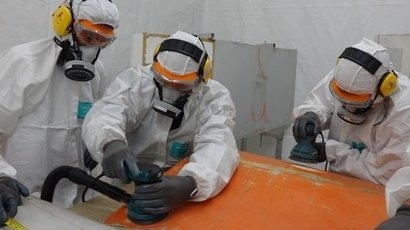
According to Altitec, a specialist in blade access, inspection and repair services, the situation also presents a risk to the standing of UK service providers in the wider European and global sectors. Altitec operates a dedicated, industry-certified, training arm known as the Altitec Academy
A growing number of projects in the UK offshore market are entering long-term operational service while large Round 3 sites are being prepared for construction in the near future. This will in turn generate a significant growth in demand for specialist personnel requiring the provision of targeted training opportunities within the UK supply chain. In particular, UK providers of the essential maintenance services required to keep project downtime to a minimum – including blade inspection and repair – urgently need to increase the scope of training programmes and the rate at which new technicians are trained in order to cater for this demand.
Blade damage is one of the leading causes of downtime across the on and offshore wind energy sectors. Due to weather constraints, particularly in the offshore sector, blade repair windows are limited and it is crucial that both scheduled maintenance and urgent repair work is conducted effectively and on schedule in order to avoid a longer-term financial impact on the balance sheet.
While time and cost-saving foundation-based inspection techniques are being explored on offshore sites, highly-trained and experienced blade repair technicians still offer the only reliable means of ensuring that issues are identified and swiftly resolved.
Unfortunately, in the UK sector, these technicians are not currently being trained at a rate that is proportional to growing demand. Consequently, the industry is at risk of a long-term skills shortage that may adversely impact both the quality and availability of blade inspection and repair services and affect opportunities for UK-based firms to become established offshore wind maintenance providers.
This emerging skills gap is exacerbated by a current lack of widely recognised higher-level training standards for blade technicians. While the RenewableUK BRAI (blade repair and inspection) standard was introduced in 2014 and currently forms the basis for early-stage training courses, as delivered by the Altitec Academy, no internationally-recognised standard is currently available for the more advanced training qualifications required to prepare technicians for the demands of servicing blades at height offshore.
“Via our Altitec Academy training courses, we’re currently able to train up to 150 blade inspectors and repair technicians each year” said Tom Dyffort, Managing Director, Altitec Group. “However it’s unrealistic to think that we’re anywhere near plugging the skills gap for blade repair and inspection in UK offshore wind – particularly since specialist, on-site training can take up to 25 weeks to complete. It’s important that the issue receives greater attention and high-level support when it comes to developing recognised standards and creating industry-wide best practice.”
Altitec is currently working on a retained contract providing blade inspection and repair services at E.ON’s Scroby Sands Offshore Wind Farm, off the east coast of the UK, deploying the latest rope access technology and blade inspection techniques to minimise inspection times on the project. The specialist training its technicians have received, as well as the use of advanced rope access technology such as the ActSafe Ascender, has so far cut blade maintenance times by around a third.
The intensive 5-day training courses offered by the Altitec Academy include the RenewableUK accredited “Awareness and Basic Rotor Blade Inspection and Repair” (BRAI) certification - providing an insight into how to spot operational rotor blade damage and conduct minor blade surface repairs – and Altitec’s in-house “Composite Rotor Blade Repair Training” module, teaching the fundamentals of rotor blade repair off the ground.
Combined, these certificates leave participants well-placed either to take key skills and lessons learnt back to operational wind farms throughout the UK and Europe or start careers as blade technicians in the expanding on- and offshore sectors.
For additional information:

